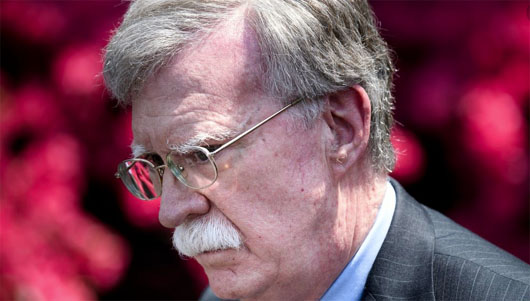Special to WorldTribune.com
Radio Free Europe / Radio Liberty, May 30, 2019
The United States and key Middle East allies Saudi Arabia and the United Arab Emirates stepped up pressure on Iran, warning against any attacks and taking measures to bolster cooperation to counter Teheran’s regional activities.

The actions and comments on May 29 came amid escalating tensions between Iran and the United States.
U.S. national-security adviser John Bolton warned Iran that any attacks on U.S. interests or allies in the Persian Gulf will draw a “very strong response” from Washington following a series of violent incidents and a beefing up of U.S. military assets in the region.
Meanwhile, Saudi Arabia’s foreign minister, Ibrahim al-Assaf, told a gathering of foreign ministers of the Organization of Islamic Cooperation (OIC) in Jeddah that “Teheran’s support for Houthi rebels in Yemen is proof of Iranian interference in other nations’ affairs and this is something that…Islamic countries should reject.”
Sunni-led Saudi Arabia is an arch-rival of Shi’ite-majority Iran and the countries are locked in what many people call a proxy war between Teheran-backed Houthi rebels and the Saudi-supported government in Yemen.
Separately, the United States and another key Persian Gulf ally, the United Arab Emirates, announced that a defense-cooperation agreement signed earlier this year had come into effect.
The pact will “enhance military coordination” between the United States and the U.A.E., “further advancing an already robust military, political, and economic partnership at a critical time,” a joint statement by Bolton and U.A.E. Crown Prince Sheikh Muhammad bin Zayed al-Nahyan said.
Bolton’s hard-line rhetoric contrasted with recent remarks by President Donald Trump, who said two days ago that the United States was not “looking to hurt Iran at all” and would “like to talk” to Teheran.
Bolton, speaking to reporters in Abu Dhabi, the U.A.E. capital, said Iran was “almost certainly” behind attacks on oil tankers off the coast of the U.A.E. earlier this month.
Bolton tweeted that he met with Nahyan and the country’s national-security adviser to discuss “our strategic partnership and regional challenges.”
Regional summits are planned on May 30-31 in Mecca, Saudi Arabia, as Riyadh attempts to further isolate Teheran.
Washington has blamed Teheran for the May 12 attacks that allegedly damaged four vessels, including two Saudi oil tankers.
Bolton was quoted by the U.A.E. newspaper The National as saying the May 12 attacks on the four tankers were caused by “naval mines almost certainly from Iran.”
“I think it is clear these [attacks] were naval mines almost certainly from Iran,” Bolton asserted. “There is no doubt in anybody’s mind in Washington who is responsible for this, and I think it’s important that the leadership in Iran know that we know.”
A five-nation team of experts, including Americans, is investigating the May 12 attacks.
Bolton also said there was a failed attack recently on the Saudi port city of Yanbu, the terminus point of Saudi Arabia’s east-west pipeline, adding that he suspected Iran was behind it. He did not elaborate.
Saudi Arabia has accused Teheran of ordering drone strikes on its east-west pipeline and other oil installations in the kingdom that were claimed by Huthi rebels in Yemen.
“The point is to make it very clear to Iran and its surrogates that these kinds of action risk a very strong response from the United States,” Bolton said, without elaborating.
Iranian Foreign Ministry spokesman Abbas Musavi called the allegations “ridiculous” and said Washington’s “malign intentions” in the region were to blame.
Iranian President Hassan Rohani said the “road is not closed” to talks with the United States, but only if Washington returns to the 2015 nuclear accord between world powers and Iran that curbed the country’s nuclear program in exchange for relief from crippling economic sanctions.
However, Supreme Leader Ayatollah Ali Khamenei reiterated that Tehran “will not negotiate with America, because negotiation has no benefit and carries harm,” according to his website.
Relations between Teheran and Washington have plummeted since the United States pulled out of the agreement one year ago.
Since then, Washington has reimposed sanctions, stepped up its rhetoric, and beefed up its military presence in the Middle East.
Meanwhile, the White House announced that Bolton, Israeli national-security adviser Meir Ben-Shabbat, and Nikolai Patrushev, the secretary of Russian President Vladimir Putin’s Security Council, will meet in Jerusalem in June to discuss security in the Middle East.
